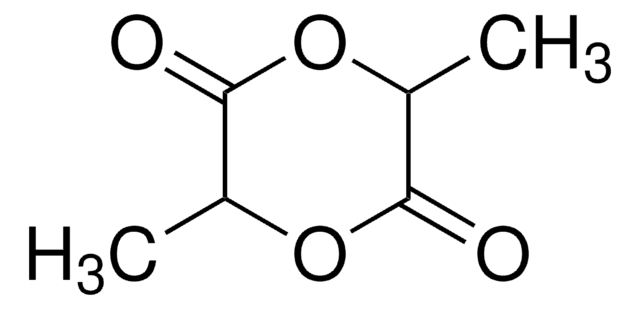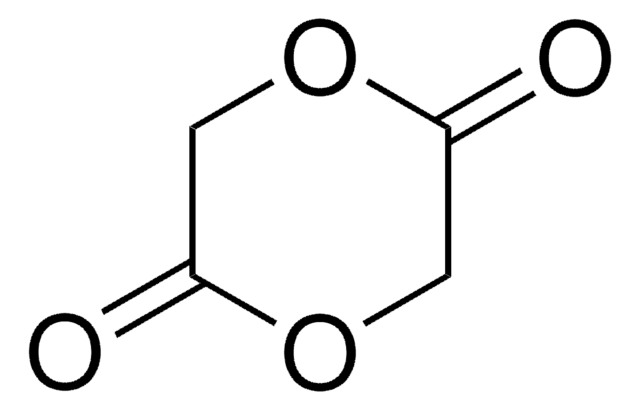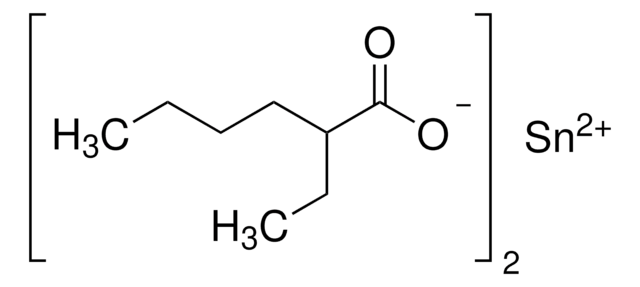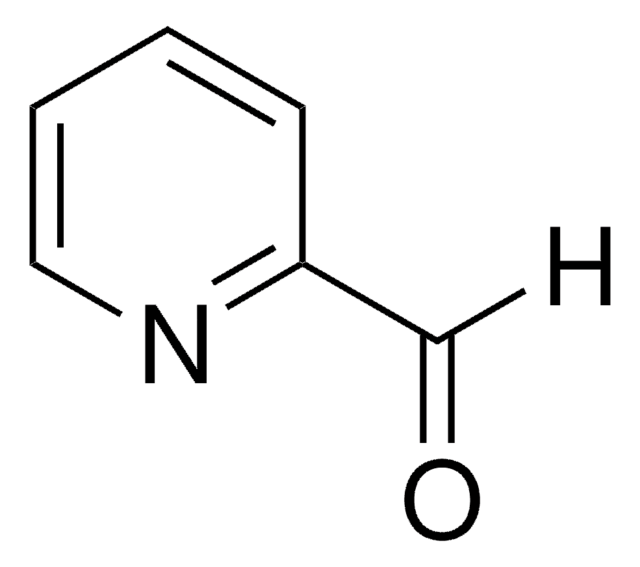367044
(3S)-cis-3,6-Dimethyl-1,4-dioxane-2,5-dione
98%
Synonym(s):
L-Lactide
Sign Into View Organizational & Contract Pricing
All Photos(2)
About This Item
Empirical Formula (Hill Notation):
C6H8O4
CAS Number:
Molecular Weight:
144.13
EC Number:
MDL number:
UNSPSC Code:
12352005
PubChem Substance ID:
NACRES:
NA.22
Recommended Products
Quality Level
Assay
98%
form
crystals
optical activity
[α]20/D −285°, c = 1 in toluene
mp
92-94 °C (lit.)
functional group
ester
storage temp.
2-8°C
SMILES string
C[C@@H]1OC(=O)[C@H](C)OC1=O
InChI
1S/C6H8O4/c1-3-5(7)10-4(2)6(8)9-3/h3-4H,1-2H3/t3-,4-/m0/s1
InChI key
JJTUDXZGHPGLLC-IMJSIDKUSA-N
Related Categories
Application
(3S)-cis-3,6-Dimethyl-1,4-dioxane-2,5-dione may be used in the synthesis of optically active terpyridine containing poly(L-lactide)s, polydisperse lactic acid oligomers, bicyclic and tricyclic lactide derivatives.
Employed in the synthesis of biodegradable copolymers.
Signal Word
Warning
Hazard Statements
Precautionary Statements
Hazard Classifications
Eye Irrit. 2
Storage Class Code
13 - Non Combustible Solids
WGK
WGK 3
Flash Point(F)
Not applicable
Flash Point(C)
Not applicable
Personal Protective Equipment
dust mask type N95 (US), Eyeshields, Gloves
Choose from one of the most recent versions:
Already Own This Product?
Find documentation for the products that you have recently purchased in the Document Library.
Customers Also Viewed
Makromol. Chem., 194, 907-907 (1993)
Monodisperse enantiomeric lactic acid oligomers: preparation, characterization, and stereocomplex formation.
De Jong SJ, et al.
Macromolecules, 31(19), 6397-6402 (1998)
G Perego et al.
Biomaterials, 15(3), 189-193 (1994-02-01)
A copolymer of L-lactide and 6-caprolactone (50:50, w/w) was synthesized and characterized. The thermal behaviour of this material did not show any crystallinity for several months; only after more than 1 yr of aging at room temperature and, particularly, in
Jun Zhang et al.
Polymers, 11(5) (2019-05-15)
To improve the hemocompatibility of the biodegradable medical poly(ether-ester-urethane) (PEEU), containing uniform-size aliphatic hard segments that was prepared in our lab, a copolymer containing phosphorylcholine (PC) groups was blended with the PEEU. The PC-copolymer of poly(MPC-co-EHMA) (PMEH) was first obtained
Wenjun Liu et al.
Materials science & engineering. C, Materials for biological applications, 103, 109851-109851 (2019-07-28)
Favorable cytocompatibility and osteogenesis potential are critical for the development of a bone repair material. In this study, two types of surface-modified whiskers, grafted magnesia and chitin (g-MgO and g-CHN) whiskers, were synthesized and introduced into a poly(l-lactide) (PLLA) matrix
Our team of scientists has experience in all areas of research including Life Science, Material Science, Chemical Synthesis, Chromatography, Analytical and many others.
Contact Technical Service










